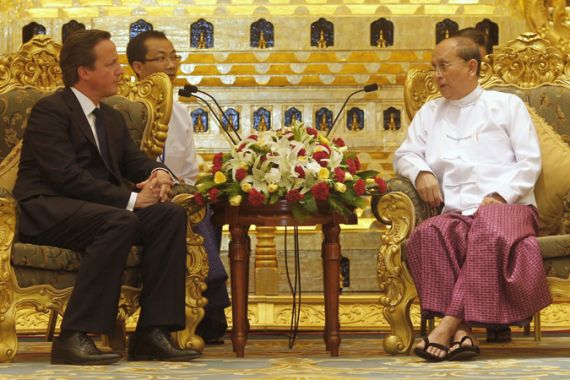UK’s Cameron in landmark Myanmar visit
First Western leader to visit in decades “wants to see how things are going” before pushing for end to sanctions.

David Cameron, the British prime minster, has arrived in Myanmar on the first visit to the once-isolated country by a Western leader since the end of direct military rule in 2010.
Cameron on Friday met President Thein Sein in the capital Naypyidaw, and is also expected to hold talks with opposition leader Aung San Suu Kyi in Yangon.
The visit marks a further sign of thawing relations between Western nations and the reform-minded government of a country still subjected to international sanctions after decades of military rule and long condemned for human rights abuses.
“There is a government now that says it is committed to reform, that has started to take steps, and I think it is right to encourage those steps,” Cameron said after arriving in Naypyidaw.
But he said people should be “under no illusion about what a long way there is to go”, and said Myanmar’s leaders want to demonstrate that moves towards democracy were “irreversible”.
Following his meeting with President Thein Sein in the capital, Cameron met with Nobel Peace Prize winner, and opposition leader, Aung San Suu Kyi, in her Yangon home.
Referring to the opposition leader, he called Suu Kyi, who was locked up for much of the past 22 years, “a shining example for people who yearn for freedom, for democracy, for progress”.
Reporting from Bangkok in neighbouring Thailand, Al Jazeera’s Aela Callan said Cameron was expected to discuss reforms in the country and offer help in reforming the the nation’s judiciary.
The UK has strong historic links with Myanmar, which it ruled as a colony, then known as Burma, until independence in 1948.
Economic trade
Prior to his arrival, Cameron had said that he would probably push for an easing of European Union sanctions against Myanmar following his landmark visit to the nation.
“If Burma moves towards democracy then we should respond in kind, and we should not be slow in doing that. But first I want to and see for myself how things are going,” Cameron told the BBC, referring to the nation by its former name.
“Just as Britain played a leading role in Europe in placing tough sanctions on that regime, so we should be the
ones if we are satisfied change is taking place, we should be the ones not being backwards in our response.”
A formal decision on whether to ease European trade bans is expected on April 23.
Of the economic impact of lifting trade sanctions with a nation of 60 million, our correspondent said “it’s no secret that there are many business interests in Myanmar”.
The fact that the nation has been “largely unexploited in terms of business opportunities” is part of what is driving a steady stream of foreign dignitaries, including US Secretary of State Hillary Clinton and British Foreign Secretary William Hague to the nation once seen as a pariah state, said our correspondent.
Myanmar’s military rulers ceded power a year ago to a quasi-civilian government following a November 2010 election marred by opposition complaints of rigging and won by a party set up by the military.
“In a world where there are many dark and depressing chapters of history being written there is a potential chapter
of light. Of course we should be sceptical, of course we should be questioning,” Cameron said ahead of his visit.
The new government has released hundreds of political prisoners and introduced a wave off reforms including loosening media controls, allowing trade unions and protests, talks with ethnic minority rebels and sweeping economic changes.
In landmark parliamentary by-elections earlier this month, Nobel peace laureate Suu Kyi was elected to Myanmar’s parliament after decades as a prisoner of the country’s military regime.